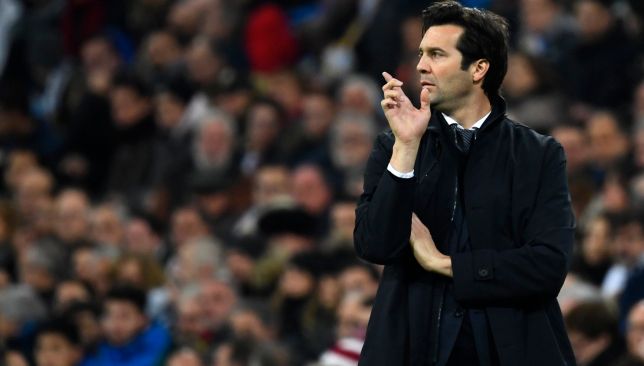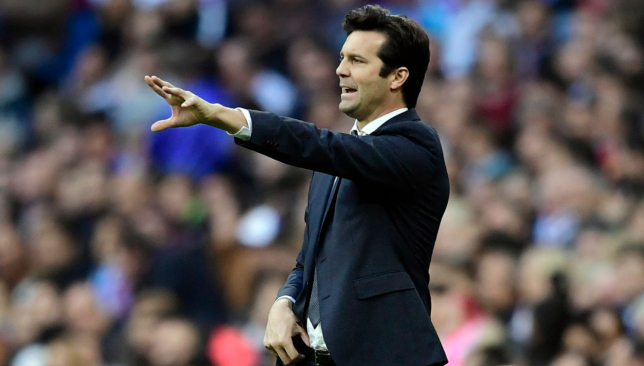
Real Madrid weathered a barrage of pressure to steal a 2-1 victory over Real Betis on Sunday night, with former Betis midfielder Dani Ceballos coming off the bench to score the winner from a late free-kick.
Luka Modric had given Madrid an early lead but the home team’s fluid football allowed them to dominate possession, especially in the second half, and Sergio Canales’s equaliser was the least they deserved.
But Madrid’s backline held firm and Ceballos stole the show, and his contribution is the obvious starting point for our three talking points to emerge from the action.
Ceballos proves a point
Over the last few weeks there has been plenty of talk about Solari’s decision to axe Isco, which continued on this occasion as the coach opted to give a start in midfield to youngster Fede Valverde, and then introduced youngsters Cristo Gonzalez and Brahim Diaz from the bench.
But Isco isn’t the only player who has been overlooked by Solari, with the same fate also befalling Dani Ceballos who hasn’t started a league game for more than a month despite making a bright start to the campaign under previous boss Julen Lopetegui.
With a long injury list to contend with, however, Solari had little option other than to introduce Ceballos (other than Isco, who apparently isn’t an option at all) when he wanted to add another body in midfield during the second half.
And although Ceballos was not particularly heavily involved in the action as his team carried out a rearguard action against the home team’s almost uninterrupted possession, he fully seized the chance to make an impression by rifling home the winning free-kick with a low shot into the right corner inside the final couple of minutes.
That goal and his refusal to celebrate against his former team further enraged the Betis fans who felt betrayed by his departure to the capital a couple of years ago, but it also sent a reminder to Solari that he should be considered for more playing time. Whether the coach listens, however, is another matter…just as Isco.

Ceballos scored the winner.
Solari rings the changes
Madrid boss Solari took some bold decisions with his team selection, firstly by reverting to a back three with Nacho coming into the centre of defence alongside Sergio Ramos and Rafael Varane. As well as continuing to overlook Isco, Solari also surprisingly overlooked another established star, with Marcelo left on the bench and Sergio Reguilon placed in the wingback position.
They were all unexpected moves, and to Solari’s credit it worked well in the first half. The extra man in defence helped snuff out Betis’s attempts to play precise passes around the edge of the box, and the pace of Vinicius on the break was supported well by the advanced wide positions of Reguilon and Dani Carvajal.
It was a different story after the break, though. Hampered by yet another injury as Karim Benzema went off with a hand fracture, the visiting team was overwhelmed and had virtually no attacking presence in the game. Fortunately the back three were excellent, repelling a series of crosses and balls into the box, and the unexpected bonus of Ceballos’s late goal masked a poor second half showing.
And although Solari can hardly claim to be delighted with his team’s football, it was the kind of result to breed confidence and the defensive resilience displayed throughout suggested that the manager has been able to keep everyone pulling in the same direction.

Santiago Solari.
Betis impress despite defeat
Solari wasn’t the only manager making unexpected tactical switches, with Betis boss Quique Setien also springing a surprise by changing from his team’s usual 3-5-2 shape and fielding a conventional 4-4-2.
The altered formation did not fundamentally change Betis’s style, as they continued to seek to pass their way from back to front with controlled short movements. But the loss of an extra body in the centre of midfield made it harder to control the flow of the game, and the high positions of the full-backs left the home team exposed to counter attacks as their two-man central defence lacked its usual guarantee of an extra player. As a consequence, Betis rarely looked dangerous in the first half, and they were also defensively vulnerable against the visiting team’s sharp counters.
However, it was a completely different matter in the second half, when wide midfielders Andres Guardado and Sergio Canales took up more central positions, Joaquin dropped deeper to receive more of the ball, the pace of the passing increased and play was regularly swiftly switched to fully utilse the width of the full-backs.
Those changes allowed Betis to completely dominate, resulting in the incredible statistic that they enjoyed 73.7% of the possession and outpassed Madrid by 713 to 254 – even Luka Modric was only able to make 32 passes. And although the result went against his team with the late goal from Ceballos, Setien can feel proud that they were so dominant after the break and will just rue their lack of precision in the final third.